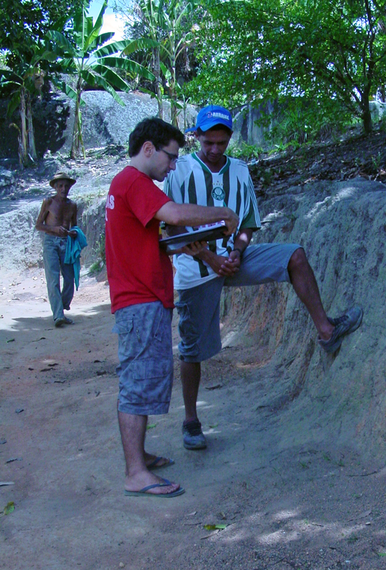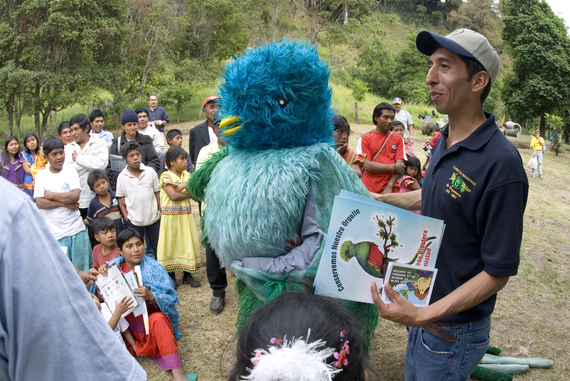Social marketing campaigns aim to influence the behavior of a target group in a way that benefits both the individual and society. This field has seen increasing efforts by conservationists seeking to address key threats to nature. However, there are many challenges to the successful application of social marketing and these campaigns can raise ethical issues. I interviewed Diogo Veríssimo, a post-doctorial Smith Fellow and scientist at Georgia State University who studies Social marketing campaigns to help us better understand them:
Question 1: What is Social Marketing?
Answer: Social Marketing is the application of marketing concepts and techniques to solve societal problems. In other words, Social marketing asks the question: "Why can't you sell brotherhood like you can sell soap?" Most of social marketing tools are based on concepts initially developed in the commercial sector and have a root in social sciences such as psychology, sociology and anthropology. The field had its origins in the late 1960s and originally focused on public health issues such as smoking cessation, substance abuse, sexual health or healthy eating.
One example of a social marketing effort are the truth® campaigns implemented in the USA in the 2000s, which aimed to reduce the number of teenagers that took up smoking. The campaigns used a mix of online and offline channels, and focused on presenting the health risks associated with smoking in a way that empowered teenagers to make their own choices. It is estimated that the truth® campaigns were directly responsible for keeping 450,000 teens from starting to smoke during its first four years and saved up to $5.4 billion in medical care costs to society.
Social marketing represents a turning point in how we address societal challenges because it brings with it the extensive practical knowledge gained by marketing researchers and advertising firms in the last century. The commercial sector's main challenge is influencing human behavior in order to drive the purchase of a given product or service. In many ways, this is not fundamentally different from the changes in behavior we need to promote when it comes to the key social and environmental challenges of our time.
Question 2: How can Social Marketing help conserve nature?
Answer: All key threats to nature are the results of the choices we make every day. Whether its climate change, invasive species or habitat destruction, it all boils down to human behavior. As such, mitigating the threats to nature is not about biology but about understanding why we make the decisions we make and how our choices can be influenced to become more sustainable. Social Marketing offers conservationists the tools to do just that.
One example I am currently involved in is a program called Fish Forever, which uses social marketing to improve the sustainability of small scale coastal fisheries across five countries: Indonesia, Philippines, Mozambique, Brazil and Belize. The idea behind our approach is to empower local communities to manage their resources by establishing local reserves. Within Fish Forever, social marketing has the role of ensuring that the benefits and limitations of this approach are presented in a clear and locally relevant way to stakeholders and that any management solution has local support. The social marketing campaigns use traditional marketing methods such as billboards and posters but also community events and endorsements from local leaders to give fisheries management more attention and highlight the need for long-term management. This effort to build local support is pivotal, as conservationists know from past experience that the management of natural resources is a political and sensitive topic. Without the support from local communities, nothing can be achieved in the long-term.
Question 3: What are the marks of an effective social marketing campaign?
Answer: Successful social marketing is all about being able to see an issue through the eyes of the group of people who you are trying to influence. Only by understanding their values and motivations when it comes to the behavior you are targeting can you hope to drive change.
For example, conservationists are working to reduce the demand for ivory in some Asian countries. For this to work, however, we need to know who buys ivory and for what reasons. This is why research is so important in social marketing. Without having data to paint a good picture of our target audience, we risk sending out the wrong sort of message or simply not reaching those relevant to the issue we are interested in.
Question 4: What is the difference between social marketing and advertising?
Answer: Advertising is just one small part of marketing. In other words, all advertising is marketing, but not all marketing takes the form of advertising. Advertising refers to the paid announcement of a message by a sponsor to potential customers, but marketing includes many more components, like consumer research, product pricing and distribution, and public relations. In essence, marketing is everything that is done to facilitate an exchange between company and consumer.
Understanding the difference between advertising and marketing is important as it is easy to think that a marketing campaign begins and ends with the billboards or TV ads you have contact with. However, there is an enormous amount of research and planning that goes into a marketing campaign but which is usually invisible to the public.
Question 5: If the purpose of social marketing is to benefit society, how do social marketers decide what behaviors need to be changed? Doesn't this raise ethical issues about manipulation?
Answer: Social marketers are usually focused on issues that are critical to human survival, perhaps the strongest human instinct. Not many would argue against clean water or improved health. Nonetheless, social marketers are well aware of the ethical issues that have for a long time plagued the commercial marketing sector. This has led to a strong emphasis on ethics, visible for example in the consensus definition of social marketing endorsed by Boards of the International, European, and Australian Social Marketing Associations.
We should also remember that social marketers use the same methods and tools businesses use to the benefit of their shareholders, so by engaging in marketing we are simply putting public concerns at the same level as private ones. The average US citizen is exposed to about 600 ads every day and by excluding health and the environmental messages from this arena we are allowing them to slip out of public concern.
Dr. Diogo Veríssimo has spent the last 15 years researching the human dimensions of nature conservation, including topics such as social marketing, wildlife trade and human-wildlife conflict. His current focus is on the impact evaluation of environmental campaigns that aim to change human behavior. Dr. Veríssimo is affiliated with Georgia State University and Rare, an NGO that has pioneered the use of social marketing in biodiversity conservation. His research is supported by a David H. Smith Conservation Research Fellowship from the Society for Conservation Biology and the Cedar Tree Foundation.
Follow him on Twitter (@verissimodiogo) or learn more at his website, www.diogoverissimo.com.
Tim Ward is co-owners of Intermedia Communications Training, Inc, a Washington D.C> based firm that specializes in communications for development, economics, science and the environment, an the co-author of The Master Communicator's Handbook.


